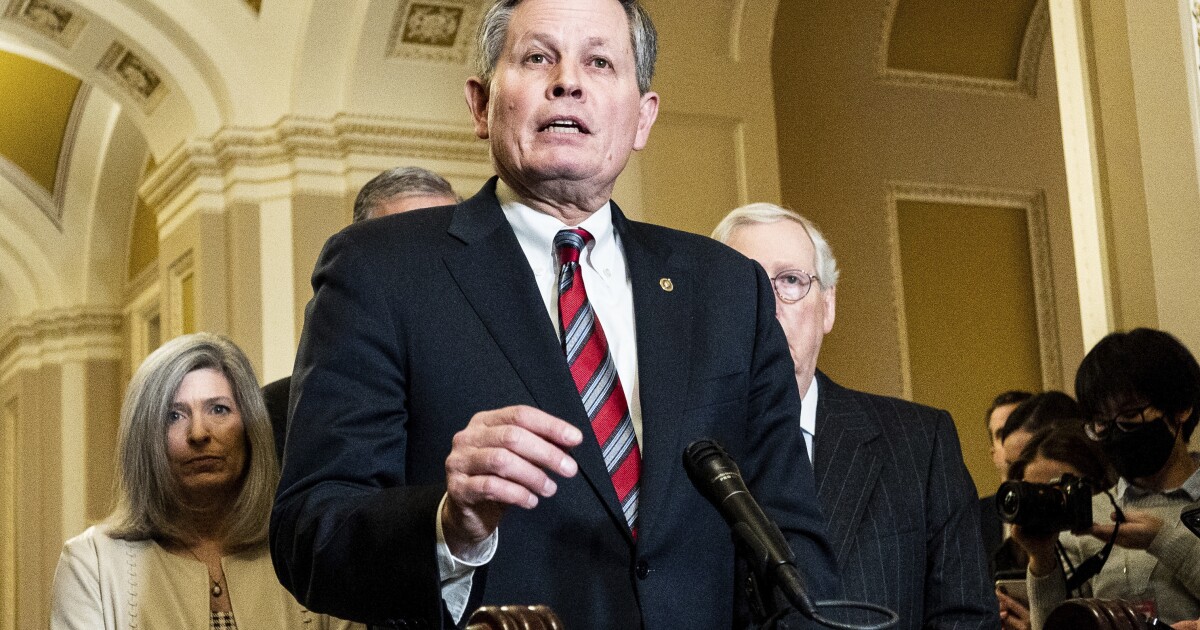

Senate Republicans are signaling they’re willing to box out weak GOP candidates in the 2024 primaries following a lackluster 2022 performance that ended with their minority shrinking in the upper chamber.
The shift reflects a widespread sense within the Republican conference that their roster of inexperienced and in some cases controversial candidates were at least partially responsible for the party’s failure to take control of the Senate.
This week, the Senate GOP’s campaign arm, under the new leadership of Sen. Steve Daines (R-MT), made clear that the committee is more willing to take sides in Republican primaries, a departure from its policy in the 2022 cycle. As soon as former Gov. Mitch Daniels decided on Tuesday not to run for Senate in Indiana to replace retiring Sen. Mike Braun (R-IN), Daines quickly pledged to work with Rep. Jim Banks (R-IN), whom he called “one of our top recruits this cycle.”
Daines’s quasi-endorsement of Banks could be clearing the field for Banks. Rep. Victoria Spartz (R-IN), who was considering an Indiana Senate run, announced Friday that she will retire and not run for office at all in 2024.
STEVE DAINES CHARTS NEW PATH FOR NRSC WITH JIM BANKS QUASI-ENDORSEMENT
The previous chief of the National Republican Senatorial Committee, Sen. Rick Scott (R-FL), declined to put his finger on the scale in open primaries, arguing that Republican voters, not the NRSC, should determine the party’s Senate nominees.
He ultimately faced criticism for that stance, with some members of his party arguing that staying out of races meant more electable candidates failed to win their primaries against those who had former President Donald Trump’s endorsement in states like Arizona, New Hampshire, and Georgia.
The GOP’s recruitment and candidate vetting efforts emerged as a point of contention between Scott and Senate Minority Leader Mitch McConnell (R-KY). Early on, McConnell predicted the Senate would be more difficult for Republicans to flip due to the caliber of Republican candidates.
Scott declined to comment on the committee’s decision to get involved in primaries, only telling the Washington Examiner, “It’s a decision they get to make.”
The change in philosophy within the NRSC appears to be welcome news to some Republicans.
“I think we’ve seen what happens when we nominate people who can win a primary but then can’t pivot toward a general election and get the broad support you need to win,” said Sen. John Cornyn (R-TX), the NRSC chairman in 2010 and 2012. “You don’t get to govern if you can’t win an election. Winning is the first important step.”
The committee’s quick decision to back Banks was viewed as a sign the party is attempting to learn from the 2022 cycle, in which candidates backed by Trump sailed through primaries before suffering general election defeats.
“If we recruit high-quality candidates, there’s no reason Republicans shouldn’t be in control of the Senate next year,” said Alex Conant, a Republican strategist and former adviser to Sen. Marco Rubio (R-FL). “But, if we have a replay of 2022, where some of our nominees have a limited appeal to independent voters or turn off Republican moderate voters, we could come up short again.”
The NRSC has taken different strategies over the years, from getting involved in Republican primaries to taking a completely hands-off approach. In 2014, the committee took a more active role in contested primaries after being burned by intraparty warfare in the previous two election cycles. That year was ultimately a major success, with Republicans taking back control of the upper chamber.
“It makes sense to proactively promote high-quality candidates,” Conant said.
However, some Senate Republicans, such as Sen. Ted Cruz (R-TX), believe the committee should not be inserting itself into Republican primary races.
“I have long said that I don’t think the NRSC should be involved in primaries and that I think their history in terms of being involved in primaries has not been a good one — they often get it wrong,” Cruz told the Washington Examiner on Thursday. “I think the NRSC in the past opposed in primaries senators like Mike Lee and Rand Paul and Marco Rubio. I think those decisions are better made by the voters rather than the folks in Washington.”
Cruz admits candidate quality was a problem in the last cycle but believes it should be individual senators who make endorsements rather than the committee.
“I think we could have run substantially stronger candidates. I played a very active role in trying to support stronger candidates, for example, in Pennsylvania. I endorsed David McCormick right out of the starting gate,” Cruz said. “I campaigned with him all across the state. I think if Dave had been the nominee, I think we would have won that race, and unfortunately, he narrowly lost that race.”
While the Indiana Senate seat is likely safely in Republican hands in 2024, the party is eyeing pickup opportunities in red states such as Ohio, West Virginia, and Montana. It is also eyeing battleground states like Michigan, where incumbent Sen. Debbie Stabenow (D) recently announced her retirement, and Pennsylvania, where it’s still unclear whether Sen. Bob Casey (D-PA) will run for reelection after he was recently diagnosed with prostate cancer.
In Pennsylvania, McCormick is being urged to run for Casey’s seat. The party also sees a strong candidate in West Virginia Gov. Jim Justice (R), who is apparently leaning toward running to replace Sen. Joe Manchin (D-WV).
“Obviously, as a governor, he’s starting out in a strong position, but it’s just too early right now,” Daines told the Washington Examiner in December, declining to disclose if the committee is actively encouraging Justice to run.
Republican operatives, many of whom believe Trump no longer has the same cachet within the party, are hopeful there could be a slate of promising candidates this cycle.
“Outside groups and the party overall will be less influenced by Trump’s endorsements,” said a GOP strategist speaking on the condition of anonymity in order to reflect candidly on the 2024 races. “I think this cycle, the base will be willing to face off against the former president if he endorses someone who is unelectable in primaries.”
Another promising pickup opportunity for Republicans is emerging in Arizona, where the party hopes to capitalize on Sen. Kyrsten Sinema’s (I-AZ) recent decision to leave the Democratic Party. Should Sinema enter the 2024 race, she and Rep. Ruben Gallego (D-AZ) could split the Democratic vote, giving the GOP a better shot at winning the seat.
But, some Republican operatives in Arizona and across the country are concerned that two failed 2022 candidates, Blake Masters and Kari Lake, are eyeing Senate runs there in 2024. Masters, who lost his Senate bid last year by 5 percentage points, is mulling another run, as is Lake, the former local news anchor who lost her 2022 gubernatorial bid.
This week, Lake met with NRSC officials while in Washington, D.C., to attend the National Prayer Breakfast, a common practice that does not necessarily indicate a preference by the committee.
GALLEGO’S ARIZONA SENATE RUN PUTS DEMOCRATS IN A BIND
Jon Seaton, a Republican political strategist and founding partner of the Arizona firm Camelback Strategy Group, said it’s time for the party to turn the page on the 2022 races.
“I’d like to see someone who can appeal across the party. I’d also like to see someone who can appeal to independents and conservative Democrats,” Seaton said in a phone interview. “I don’t know if it needs to be someone who has never run before, I don’t know if that profile matters as much as someone who has the desire and the ability to appeal to the broad coalition of Republican voters and in a general election appeal to independents, conservatives, and Democrats.”
CLICK HERE TO READ MORE FROM THE WASHINGTON EXAMINER
The emerging landscape raises questions about if and how the committee should intervene in contests in battleground states. Braun, the Indiana Republican senator, believes those decisions should be made on a case-by-case basis.
“In the last election, we could tell where candidate quality would be an issue,” Braun told the Washington Examiner Thursday. “If you got a slate of really good potential candidates, I’d say hands off. If you have a feeling it may go south, you might want to intervene.”






